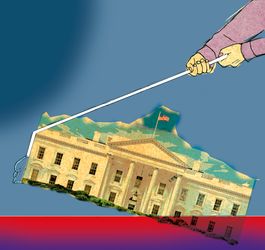You may lie to your spouse but, as an old adage goes, not to your doctor or lawyer. The doc has to know how many cigarettes you smoke, and how many drinks you down so that he can repair your blackened lungs and bloated liver. Your lawyer needs to know if you had actually poisoned your cheating spouse and how, so that he can save you from the gallows by making the whole affair appear to be a case of accidental drug overdose.
Riding on the adage is a sacred trust—that, like a pastor at the confessional, both these guys would keep their mouths shut. Even if he knows that his client is the devil himself, the lawyer has to defend the fellow as if he is an angel from heaven who has lost his way. And there is no law—god’s or man’s—that compels a lawyer to state the truth that his client had confided in him.
It was this trust that made Donald Trump, indeed a devil, share with his lawyers his criminal act of stealing state secrets when he was leaving the White House two winters ago. But now it appears, some of those attorneys may be telling on him. A judge has ordered them to.
Horror of horrors! Isn’t it a breach of trust—a privilege that has been sanctified by law? Indeed, client-attorney privilege has been sanctified under common law, which most of us in the English-speaking world follow. We have it protected in Section 126 of the Indian Evidence Act, 1872. As John M. Barkett, a prolific American law-writer says, “The attorney-client privilege is a crown jewel of the legal profession.”
How then can a judge ask an attorney to spill his client’s beans? Let’s get the facts first, and then the law.
While Trump, defeated in the 2020 presidential polls and beaten in a bid to besiege the Capitol, was leaving the White House, he took several boxes of secret papers, and showed some of those to people who were not supposed to see them. He had a battery of lawyers to assist him in deciding what to take, where and how. When they told him that some of his orders would be illegal, he snapped back that he would deny the charge. In short, the guy knew he was doing wrong, and was asking his lawyers if there was some way in law by which it wouldn’t be illegal.
Now let’s get the law. In the normal run, there is no way any court, judge or god can compel an attorney to spill any secret told to him by his client, even if the client is Ajmal Kasab, one of the Nirbhaya killers, Trump or the Devil himself. The law does not distinguish between a saint and a scoundrel when it comes to application. If an attorney breaches his client’s trust, the bar lords will tear up his licence to practise and send him home.
But there are exceptions. One, there is no way a client can confide in his lawyer his intent to commit a crime. You can’t tell your lawyer that you are planning to poison your spouse and ask him to make it look like a case of accidental drug overdose. There the attorney can simply phone the police and prevent a crime, as the priest tried to in the Amitabh Bachchan starrer Aakhree Raasta, or its original Tamil Kamal Haasan-starrer Oru Kaidhiyin Diary.
In Trump’s case, a federal judge has ruled that a couple of his attorneys could be asked to testify since there is sufficient evidence that Trump had intentionally misled them about carting classified stuff away. He had told them that they were not secrets.
An appeals court has stayed the order for now, but a final ruling could come any day. If it goes against Trump, take my word, it would give the jitters to lawyers across the world.
prasannan@theweek.in


